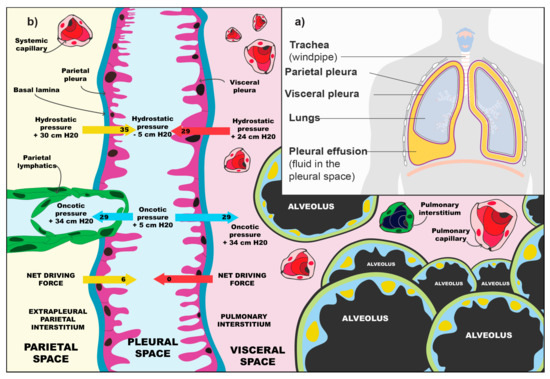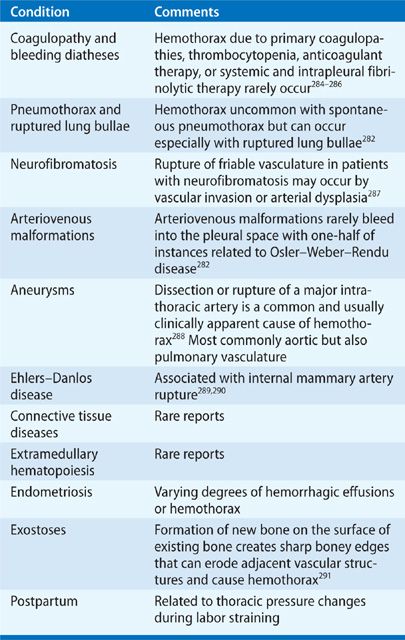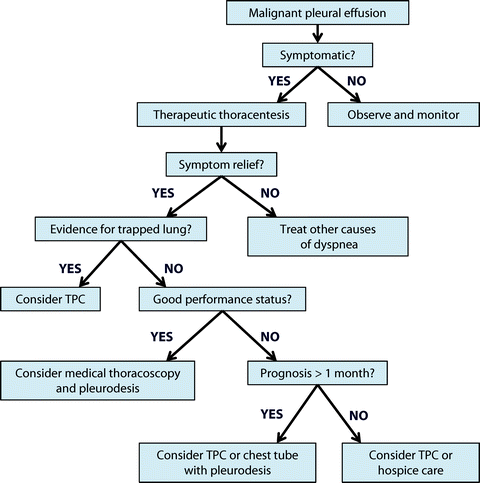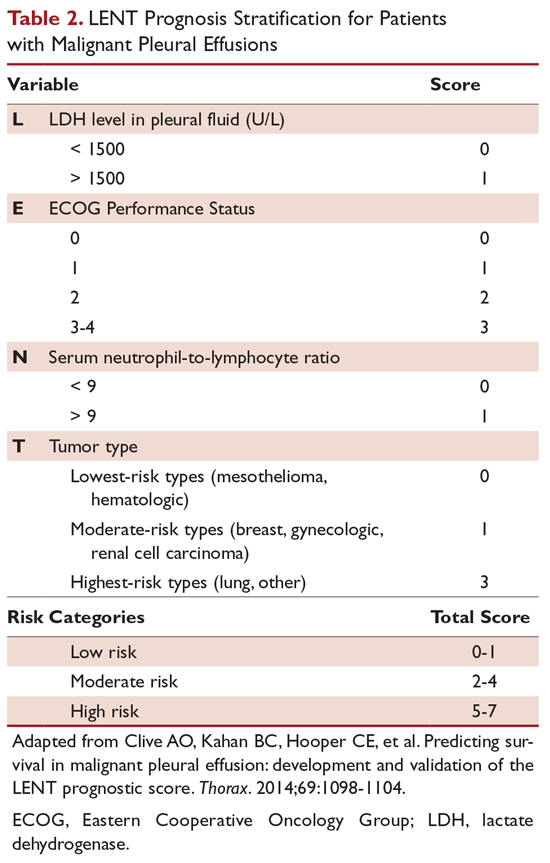what is the prognosis for malignant pleural effusion
Malignant effusions may change the staging and subsequent prognosis of the underlying cancer. Median survival after diagnosis is 4 to 9 months 13 although prognosis varies considerably depending on the type and stage of the malignancy.

Overall Survival Probability According To Malignant Pleural Effusion Download Scientific Diagram
The most common causes are lung cancer and breast cancer.

. Malignant pleural effusion which is a common clinical problem in patients with cancer may be due to both primary thoracic tumours or to a metastatic spread in the chest and constitutes the first sign of disease in approximately 10 of patients. Almost all cancers can potentially produce a pleural effusion. Am J Respir Crit Care Med Vol.
A malignant pleural effusion is when the fluid builds up because of cancer. The most common underlying tumors are lymphomas and cancers of the lung breast and ovaries which account. Symptomatic malignant pleural effusion is a common clinical problem.
Traditionally this has been achieved by. It relieves respiratory symptoms without compromising the quality of life and the complication rate is low even in an emerging country with a low socioeconomic and under-educated patient population. For You News Perspective.
681 views Answered 2 years ago. Effusions can happen in other parts of the body like around joints. Statistics show that the median survival time 50 have died and 50 still.
Malignant Pleural Effusion A malignant pleural effusion MPE is the build up of fluid and cancer cells that collects between the chest wall and the lung. This condition is associated with very high mortality with life expectancy ranging from 3 to 12 months. Dyspnea may cause limitations in ability to perform activities of daily living in a substantial proportion of patients.
The prognosis of cases where the effusion is due to carcinoma of the lung or due to cancer of the gastrointestinal tract or ovarian cancer is the poorest. If there is a pleural effusion present then that means the cancer is metastatic. Im not sure for other cancers as I dont treat them but I suspect 12 months or less.
Malignant pleural effusion MPE is common with an estimated annual incidence of 150 000 in the USA alone and given the year-on-year increase in new cancer diagnoses the incidence is set to rise1 2 MPE represents advanced malignant disease and current guidelines quote median survivals of between 3 and 12 months3 Pleural and oncological treatment. Development of a malignant pleural effusion is associated with a very poor prognosis with median survival of 4 months and mean survival of less than 1 year. As previously mentioned this condition often indicates the presence of advanced stage lung cancer or breast cancer.
Malignant pleural effusion MPE is a common and important clinical condition. A complication in many types of tumors its presence indicates the onset of the terminal stages of cancer. Malignant pleural effusion MPE occurs in 15 of all cancer patients and usually portends poor prognosis while also serving to limit the patients quality of life.
Development of a malignant pleural effusion is associated with a very poor prognosis with median survival of 4 months and mean survival of less than 1 yearref14ref15 The most common associated m. A pleural effusion is a collection of fluid between the lung and ribcage. The presence of malignant tumour cells in the pleural.
A malignant pleural effusion is a complication that involves the build-up of fluid containing cancer cells between the membranes that line the lungs. Patients with pleural carcinomatosis have a median survival time of four months. The diagnosis of a malignant pleural effusion is the first indication of a malignancy in 13 of patients with a malignant pleural effusion.
18 19 The most common associated. What are symptoms of a pleural effusion. Thus on a concluding note it can be said.
Dyspnea is the most common symptom of MPE. No previous studies however have reported long-term outcomes for patients undergoing diagnostic pleuroscopy in whom no malignancy was demonstrated either with cytologic examination of. Prognosis of Malignant Pleural Effusion.
Malignant pleural effusions MPE may either coincide with or follow the diagnosis of a primary tumor. 40 000 to 60 000 people develop malignant pleural effusion MPE in Germany each year. Malignant effusions may change the staging and subsequent prognosis of the underlying cancer.
This can cause you to feel short of breath andor have chest discomfort. Pulmonology 17 years experience. If due to heart failure cirrhosis or malignancy the effusion is likely to recur.
The prognosis of the patient with a pleural effusion depends on the underlying condition. Several studies have demonstrated the diagnostic yield of medical thoracoscopy pleuroscopy in making the diagnosis of malignant pleural effusion MPE. Palliation of symptoms has been the goal for the management of these effusions while keeping the patients hospital stay to a minimum.
Indwelling pleural catheter represents a suitable option for patients with malignant pleural effusion and short life expectancy. Patients often require multiple invasive procedures in order to gain a diagnosis and manage their symptomatic pleural effusions which. Malignant pleural effusion MPE is a common clinical problem that results in disabling breathlessness for patients with advanced malignancy.
It is a fairly common complication in a number of different cancers. How patients are best managed depends on clinical circumstances. It represents disseminated disease and confers a poor prognosis.
However most patients with a. The most common form of cancer that starts in the pleura is mesothelioma a cancer often caused by exposure to asbestos. For lung cancer typically life expectancy is around 6 months.
If cancer grows in the pleural space it causes a malignant pleural effusion This condition is a sign that the cancer has spread or metastasized to other areas of the body. However most patients with a pleural effusion have no long-term sequelae. The average malignant pleural effusion life expectancy is a little less than six months with the median survival time being as less as four months.
A pleural effusion can be serious and potentially life-threatening but it is treatable. The majority of patients with malignant pleural effusion will experience dyspnea. With lung cancer a malignant pleural.
M anaging patients with malignant pleural effusion can be challenging. Studies are contributing evidence on an increasing number of therapeutic options therapeutic thoracentesis thoracoscopic ple. Patients in these stages often have a poor prognosis with an average life expectancy of less than six months.
It occurs in around 7 to 23 of lung cancers but can also occur with other cancers such as breast cancer ovarian cancer leukemia and lymphomas. Symptoms are often distressing and its presence signifies advanced disease.

Medicina Free Full Text Malignant Pleural Effusion And Its Current Management A Review Html

Malignant Pleural Effusions Thoracic Key

Malignant Pleural Effusions Thoracic Key

Prognostic Impact Of Malignant Pleural Effusion At Presentation In Patients With Metastatic Non Small Cell Lung Cancer Journal Of Thoracic Oncology
Malignant Pleural Effusion Still A Long Way To Go Researcher An

Management Of Malignant Pleural Effusions Springerlink

Algorithm For The Management Of Malignant Pleural Download Scientific Diagram

Pdf Malignant Pleural Effusion And Its Current Management A Review Semantic Scholar

Treatment Options For Malignant Pleural Effusions Download Table

Characteristics Of Patients With Malignant Pleural Effusion Download Table

Malignant Pleural Effusion 03102017 Youtube

Mortality Among Patients With Pleural Effusion Undergoing Thoracentesis European Respiratory Society

Management Of Malignant Pleural Effusions The Figure Is Modified From Download Scientific Diagram

Ers Eacts Statement On The Management Of Malignant Pleural Effusions European Respiratory Society

The Diagnostic Steps In Suspected Malignant Pleural Effusion Table 1 Download Scientific Diagram

References In Development And Validation Of Response Markers To Predict Survival And Pleurodesis Success In Patients With Malignant Pleural Effusion Promise A Multicohort Analysis The Lancet Oncology

Algorithm For The Management Of Malignant Pleural Effusion 36 Adopted Download Scientific Diagram

Malignant Pleural Effusion Evaluation And Diagnosis Pulmonary Health Hub

Malignant Pleural Effusion Management Keeping The Flood Gates Shut The Lancet Respiratory Medicine